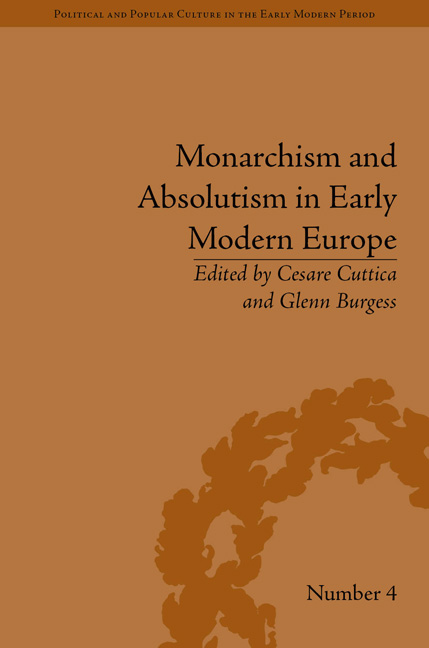Book contents
- Frontmatter
- CONTENTS
- Acknowledgements
- List of Contributors
- Introduction: Monarchism and Absolutism in Early Modern Europe
- Part I Royalists, Republicans, Patriarchalists: English Thinkers at Odds in the Seventeenth Century
- 1 A Culture of Political Counsel: The Case of Fourteenth-Century England's ‘Virtuous’ Monarchy vs Royal Absolutism and Seventeenth-Century Reinterpretations
- 2 Royalist Absolutism in the 1650s: The Case of Robert Sheringham
- 3 Patriarchalism and the Monarchical Republicans
- Part II Absolutism, Cynicism, Patriotism: Eighteenth-Century Enlightenment Reflections
- Part III Absolutism, Monarchism, Despotism in Theory and Practice: Contested Historiography and Comparative Approach
- Part IV Monarchy, the State of Nature, Religion and Iconography in European Perspective
- Notes
- Works Cited
- Index
1 - A Culture of Political Counsel: The Case of Fourteenth-Century England's ‘Virtuous’ Monarchy vs Royal Absolutism and Seventeenth-Century Reinterpretations
from Part I - Royalists, Republicans, Patriarchalists: English Thinkers at Odds in the Seventeenth Century
- Frontmatter
- CONTENTS
- Acknowledgements
- List of Contributors
- Introduction: Monarchism and Absolutism in Early Modern Europe
- Part I Royalists, Republicans, Patriarchalists: English Thinkers at Odds in the Seventeenth Century
- 1 A Culture of Political Counsel: The Case of Fourteenth-Century England's ‘Virtuous’ Monarchy vs Royal Absolutism and Seventeenth-Century Reinterpretations
- 2 Royalist Absolutism in the 1650s: The Case of Robert Sheringham
- 3 Patriarchalism and the Monarchical Republicans
- Part II Absolutism, Cynicism, Patriotism: Eighteenth-Century Enlightenment Reflections
- Part III Absolutism, Monarchism, Despotism in Theory and Practice: Contested Historiography and Comparative Approach
- Part IV Monarchy, the State of Nature, Religion and Iconography in European Perspective
- Notes
- Works Cited
- Index
Summary
This chapter treats the extent to which there was a defined role for counsellors in the service of good governance in fourteenth-century England. It focuses, first, not on what may be called high or abstract ethical and political theory. Rather, it looks at documents especially from the end of the fourteenth century which made explicit what was then judged to constitute good or bad government under specific kings, and most importantly, during the reign of Richard II. It was said at the time, and many centuries later, that Richard was deposed for his vices, most notorious among which was thought to be his deceitful rejection of those considered his ‘natural counsellors’. In contrast, I will attempt to construct a catalogue of what his virtues should have been, taking as ‘princely virtues’ and ‘good governance’ those qualities enumerated in coronation oaths, in documents found in the Statutes of the Realm, in the Modus Tenendi Parliamentum, and in ‘literature of social complaint’, and compare these with what Richard's critical contemporaries described in the ‘Record and Process’ against him. This narration of his vices came to be entered into the Rolls of Parliament. Furthermore, I hope to show that the normative theory of good governance by the end of the fourteenth century in England had come to be ‘scripted’ by an ‘aristocratic/oligarchic’ small group of powerful men at the expense of any active involvement of ‘the people’.
- Type
- Chapter
- Information
- Monarchism and Absolutism in Early Modern Europe , pp. 19 - 32Publisher: Pickering & ChattoFirst published in: 2014



